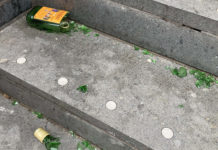Operators must act now to comply with new regulations, writes Zero Waste Scotland boss Iain Gulland

WITH the new Waste (Scotland) Regulations coming into force in just a few months, there has never been a more pertinent time for licensees to address the issue of waste management and, in many cases, save a bit of money in the process.
There is real value in our waste and it is estimated that businesses across Scotland could save up to £192 million by reducing the amount of waste sent to landfill and recycling as much waste as practicable.
The new regulations will kick in on January 1, 2014 and from this date, all businesses will be legally required to separate key recyclable materials – plastic, metal, glass, paper and card – for collection for recycling.
In addition, food businesses which produce over 50kg of food waste per week must present it for separate collection.
From January 1, 2016 the requirement to present food waste for separate collection will extend to all food businesses which produce over 5kg of food waste per week.
The Timberyard restaurant in Edinburgh is a great example, blazing a trail with its resource management techniques and implementing measures to recycle, reduce and re-use wherever possible.

The restaurant recycles more than 95% of its waste, ensuring minimal financial losses from waste created.
Good kitchen management means that very little food is thrown out and all vegetable waste is composted, providing the nutrients needed to grow salad leaves and herbs for the restaurant’s use in its own grounds. Additionally, Edinburgh tap water is filtered, chilled and offered at no charge to guests in reusable bottles; this reduces glass waste and the carbon footprint of bottled mineral water.
Further north, The Mains of Scotstown Inn in Bridge of Don is benefitting from nearly £8000 of yearly savings thanks to implementing some unique ways of handling its general waste. The business encourages guests to take away any uneaten food in a ‘doggy box’ made of recycled cardboard.
The rest of the restaurant’s food waste is placed in a wormery located in the grounds of the pub. Over 1000 worms, kept in a wheelie bin, are capable of eating their own body weight in two days. Food waste is placed here in addition to other appropriate waste, such as paper, which can help soak up the moisture created by the food. The wormery creates compost, which is then used on the pub’s herb, fruit and salad garden.
At Resource Efficient Scotland, a programme delivered by Zero Waste Scotland, we are here to help businesses get to grips with what is expected and to give advice, guidance and support in order to help retailers comply with the new Waste (Scotland) Regulations when they come into force in January 2014.
Resource Efficient Scotland offers a range of support facilities to help businesses implement waste management practices and policies, including a directory listing operators of re-use and recycling services across the Scottish regions. There is also a range of video case studies available online that bring to life the real benefits to be reaped from being more waste efficient.
I would urge all businesses to check out the support on offer through Resource Efficient Scotland in order that they can implement waste management procedures to meet the requirements of the Waste (Scotland) Regulations in January 2014, avoid potential fines and, in doing so, undoubtedly enjoy cost savings.
• Iain Gulland is director of Zero Waste Scotland.



















